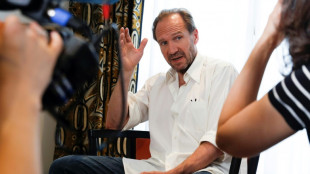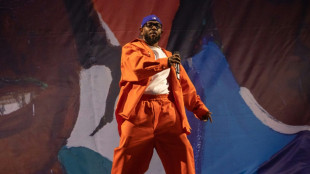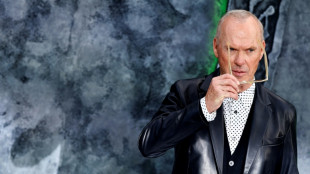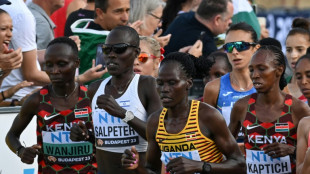
-
 Paris Paralympics close with a party after 'historic summer'
Paris Paralympics close with a party after 'historic summer'
-
Dolphins ace Hill baffled by 'crazy' police arrest

-
 'I let lot of people down', says Fritz after US Open final loss
'I let lot of people down', says Fritz after US Open final loss
-
Vatican thriller 'Conclave' drums up Oscars buzz in Toronto

-
 More civilians killed hours after Sudan rejects UN experts' report
More civilians killed hours after Sudan rejects UN experts' report
-
Ronaldo strikes late to seal Portugal win over Scotland

-
 Drought sinks longest Polish river to record-low level
Drought sinks longest Polish river to record-low level
-
East Timor prepares for first papal visit since independence

-
 Tearful Sinner dedicates US Open title to seriously ill aunt
Tearful Sinner dedicates US Open title to seriously ill aunt
-
Three things on US Open champion Jannik Sinner

-
 Ten-man Spain sink Switzerland in 4-1 romp
Ten-man Spain sink Switzerland in 4-1 romp
-
Hill sparks Dolphins comeback in wild NFL opening day

-
 Sinner sweeps to US Open title for second Grand Slam triumph
Sinner sweeps to US Open title for second Grand Slam triumph
-
Smith heroics for England remind Collingwood of Gilchrist

-
 Thousands protest Mexican judicial reform
Thousands protest Mexican judicial reform
-
Nissanka leaves Sri Lanka in sight of third Test win over England

-
 Kendrick Lamar to headline 2025 Super Bowl halftime show
Kendrick Lamar to headline 2025 Super Bowl halftime show
-
Thousands defy roadblocks in rally for Pakistan ex-PM Khan

-
 Roglic wins record-equalling fourth Vuelta
Roglic wins record-equalling fourth Vuelta
-
Russia advances in east Ukraine, launches deadly air strikes

-
 Cowboys quarterback Prescott agrees record $240 mln extension
Cowboys quarterback Prescott agrees record $240 mln extension
-
Swiss double in Paralympic wheelchair marathons, Dutch women retain basketball title

-
 New 'Beetlejuice' creeps its way to top of N.America box office
New 'Beetlejuice' creeps its way to top of N.America box office
-
South Africa captain Kolisi leaves Racing 92: French Top 14 club

-
 Funeral for slain athlete Cheptegei in Uganda on Sept 14
Funeral for slain athlete Cheptegei in Uganda on Sept 14
-
Dolphins star Hill arrested on way to season-opener

-
 Smith hits back after England collapse against Sri Lanka
Smith hits back after England collapse against Sri Lanka
-
Weather delays final regattas in Louis Vuitton Cup

-
 Venezuela's Gonzalez Urrutia: from placeholder to opposition pointman
Venezuela's Gonzalez Urrutia: from placeholder to opposition pointman
-
Marquez thanks rain for San Marino MotoGP win as leader Martin pays for gamble

-
 Boeing, union reach preliminary deal to avert Seattle-area strike
Boeing, union reach preliminary deal to avert Seattle-area strike
-
Neuville wins Acropolis Rally to close in on world title

-
 Venezuela's opposition figure fled to Spain to save 'his life'
Venezuela's opposition figure fled to Spain to save 'his life'
-
Trump, Harris tied on eve of televised presidential debate

-
 Paris Paralympics the greatest ever, say former Olympics executives
Paris Paralympics the greatest ever, say former Olympics executives
-
Pope exit revives Sri Lanka's hopes in third Test against England

-
 Gunman kills 3 Israelis at West Bank crossing as Gaza war rages
Gunman kills 3 Israelis at West Bank crossing as Gaza war rages
-
Marquez wins San Marino MotoGP as leader Martin pays for rain gamble

-
 Greece to hike fee for cruise passengers to Mykonos and Santorini
Greece to hike fee for cruise passengers to Mykonos and Santorini
-
Carsley's 'refreshing' England overhaul launches new era

-
 Swiss double in wheelchair marathons on final day of Paralympics
Swiss double in wheelchair marathons on final day of Paralympics
-
France's Le Pen urges Macron to hold referendum to break deadlock

-
 Typhoon Yagi weakens, toll rises to 14 in Vietnam
Typhoon Yagi weakens, toll rises to 14 in Vietnam
-
India's Randhir Singh elected Asian Olympic chief

-
 Under pressure, UN winds down 'unique' Iraq probe into IS crimes
Under pressure, UN winds down 'unique' Iraq probe into IS crimes
-
'Proud' athletics great Weir calls time on marathon Paralympic career

-
 'Brave' Afghanistan can beat anyone, says skipper ahead of NZ Test
'Brave' Afghanistan can beat anyone, says skipper ahead of NZ Test
-
Vaughan warns England against 'taking the mick' after Sri Lanka collapse

-
 England's Moeen Ali retires from international cricket
England's Moeen Ali retires from international cricket
-
Japan's Hirata holds off inspired Smyth to win on Asian Tour


Melnyk's journey to Olympics embodies Ukrainian fighting spirit
Ukrainian athletes may not win many Olympic medals in athletics but for 400 metres runner Tetiana Melnyk it is a triumph just to be in Paris.
At times "it seemed there was no point in continuing", Melnyk told AFP.
The war-torn nation's hopes of track and field glory lie primarily with high jump world record holder Yaroslava Mahuchikh when the action gets underway at the Stade de France on Friday.
Melnyk's athletics career has been more modest but the journey she has taken since Russian tanks rolled over the border in February 2022 would test the mettle of the toughest of competitors.
Ukrainian fencing great Olga Kharlan said on Monday after winning a bronze medal in the sabre "we (Ukrainians) are showing to all the world that we can fight" and Melnyk would be emblematic of that.
The 29-year-old, competing in her third Olympics, decided to remain in Ukraine after the invasion -- her coach and many other athletes left -- but it came at a significant cost.
"My family remained in Ukraine, and I felt that I needed to be with them, support them, and our country during this difficult time," she told AFP.
"I couldn't leave my loved ones and friends behind.
"Training under such conditions was extremely challenging.
"It was incredibly hard to cope psychologically with the constant threat to life.
"Every day, I woke up to the sounds of explosions and air raid sirens, which meant spending hours in bomb shelters."
- 'Resilience and strength' -
"There were times when it seemed there was no point in continuing, as the war had destroyed many of my sports dreams.
"I did consider retiring, and the main reason was my psychological state.
"The war introduced numerous difficulties and challenges that affected me deeply."
Melnyk said constant explosions, nightly alarms and power cuts caused by Russian attacks on power stations had "created incredibly tough conditions for training and recovery".
Ultimately, though, she could not desert the sport she had dedicated herself to from childhood.
"I realised I couldn't give up," she said.
"Sport became my way of fighting for normalcy and a source of strength."
Melnyk decided she had to wrench herself away from her family if she was to qualify for Paris. A training camp in Portugal proved crucial.
"I realized that solo training under wartime conditions was too difficult and exhausting both physically and psychologically," she said.
"I told myself: either I go to this camp, or I end my career.
"Being with other athletes, having support, and participating in joint training sessions was crucial for me."
Not only did it improve her physical condition, it also gave her a huge boost in the form of moral support from her teammates.
"Therefore, I decided not to retire."
Now there is such a bounce in her step she plans to carry on after Paris where once again she is in the relay team.
"Qualifying for the Olympics was a huge morale boost for me," she said.
"Despite all the difficulties, we are fighting not just for medals but for the chance to show the world that no war can break our will to win.
"The Olympics will be a symbol of our resilience and strength."
It is not, though, as if everything is suddenly sweetness and light, with her country still under daily attack.
"I constantly worry about my loved ones when I'm away at competitions," she said.
"The constant threat to their lives and safety is a huge source of stress and takes a significant toll on my psychological state.
"Every news report about attacks or danger in Ukraine is hard to process and distracts me from focusing on the competitions.
"What helps me the most is the support from my family, who send me words of encouragement and love."
O.Gaspar--PC
